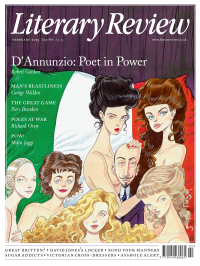Seamus Perry
James’s Bible
The Fun Stuff and Other Essays
By James Wood
Jonathan Cape 344pp £18.99
At one point in his untrustworthy recollections Kenneth Toomey, the narrator of Anthony Burgess’s Earthly Powers, cattily refers to T S Eliot’s habit of collecting up old book reviews and calling them Selected Essays. It is a deliciously wrong-headed remark, as Burgess, a clever and funny critic who collected his own reviews assiduously enough, knew perfectly well. Burgess called his own diverting ragbag of gathered pieces Homage to QWERT YUIOP, which makes disarming reference to the top line of letters on the typewriter keyboard on which he had bashed out all those notices for money. But a judicious collection of such pieces can be much more than the sum of its parts. Eliot’s Selected Essays, to take Toomey’s example (or even better Eliot’s earlier book The Sacred Wood), shows how the contingent productions of a jobbing life can be organised into a coherent and satisfying order, the essays connecting to one another by preoccupation, echo and contradiction, and creating new sorts of meaning through their well-pondered juxtapositions. Publishers won’t normally touch a collection of articles these days, no doubt with good reason, but it is striking to reflect how different the history of modern literature would have been had they always taken that line. Anyway, some of my own favourite books of criticism have had their origin this way: W W Robson’s marvellous Critical Essays, say, or Barbara Everett’s perpetually suggestive Poets in Their Time.
So the very fact that James Wood should be publishing a book that is made up entirely of pieces that have already appeared in the London Review of Books, the New Yorker, and the New Republic is itself a mark of his eminence. There are few critical collections that can

Sign Up to our newsletter
Receive free articles, highlights from the archive, news, details of prizes, and much more.@Lit_Review
Follow Literary Review on Twitter
Twitter Feed
Margaret Atwood has become a cultural weathervane, blamed for predicting dystopia and celebrated for resisting it. Yet her ‘memoir of sorts’ reveals a more complicated, playful figure.
@sophieolive introduces us to a young Peggy.
Sophie Oliver - Ms Fixit’s Characteristics
Sophie Oliver: Ms Fixit’s Characteristics - Book of Lives: A Memoir of Sorts by Margaret Atwood
literaryreview.co.uk
For a writer so ubiquitous, George Orwell remains curiously elusive. His voice is lost, his image scarce; all that survives is the prose, and the interpretations built upon it.
@Dorianlynskey wonders what is to be done.
Dorian Lynskey - Doublethink & Doubt
Dorian Lynskey: Doublethink & Doubt - Orwell: 2+2=5 by Raoul Peck (dir); George Orwell: Life and Legacy by Robert Colls
literaryreview.co.uk
The court of Henry VIII is easy to envision thanks to Hans Holbein the Younger’s portraits: the bearded king, Anne of Cleves in red and gold, Thomas Cromwell demure in black.
Peter Marshall paints a picture of the artist himself.
Peter Marshall - Varnish & Virtue
Peter Marshall: Varnish & Virtue - Holbein: Renaissance Master by Elizabeth Goldring
literaryreview.co.uk